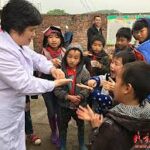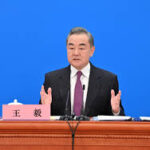Since the Communist Party of China (CPC) Central Committee and the State Council issued the Outline Development Plan for the Guangdong-Hong Kong-Macao Greater Bay Area around three years ago, construction of the Greater Bay Area has witnessed significant results.
The comprehensive strength of the Greater Bay Area has evidently improved; the cooperation among Guangdong province, Hong Kong and Macao has become deeper and more extensive; regional connectivity has constantly seen new breakthroughs and progress; and residents in the three regions have enjoyed a stronger sense of gain. These results fully demonstrate the institutional advantages and great vitality of China’s “one country, two systems” policy.
Last year, the Greater Bay Area’s gross domestic product (GDP) stood at around 13 trillion yuan ($2 trillion), and the area was home to 25 Fortune Global 500 enterprises, over 50 unicorn companies, more than 1,000 industrial incubators and nearly 15,000 investment firms.
The Greater Bay Area cultivated more than 60,000 high-tech enterprises and kicked off over 30 funded sci-tech projects involving cooperation between Guangdong and Hong Kong or Guangdong and Macao in 2021.
Last year, Guangdong-Macao In-depth Cooperation Zone in Hengqin, Guangdong, saw the number of Macao-funded enterprises rise to 4,761. Meanwhile, the Traditional Chinese Medicine Science and Technology Industrial Park of Co-operation between Guangdong and Macao (GMTCM Park) in the zone had gathered 220 pharmaceutical companies by the end of 2021.
The number of Hong Kong-funded enterprises registered in the Qianhai Shenzhen-Hong Kong Modern Service Industry Cooperation Zone in Shenzhen city, Guangdong, grew to 11,900 in 2021, during the year 93.2 percent of the foreign capital actually used in the cooperation zone were from Hong Kong.
With the support of the CPC Central Committee and central government, Hengqin and Qianhai cooperation zones become experimental fields for innovation, fully exploring market potential and stimulating market vitality.
The cross-border collaborative innovation and in-depth regional cooperation in the Greater Bay Area based on the “one country, two systems” policy and involving three customs territories and three currencies is an unprecedented exploration in the world.
Over the past three years or so, Guangdong, Hong Kong and Macao have actively promoted the connectivity of rules, institutions and infrastructure, and elevated the level of regional market integration, striving to develop the Greater Bay Area into a gateway hub for high-level opening-up.
As expressways stretch across rivers and the sea, the transportation of the Greater Bay Area has been further improved. A tightly knit three-dimensional transportation network covering all 11 cities involved in the Greater Bay Area is taking shape, gradually allowing residents to travel between these cities in one hour. Such “hard connectivity” of infrastructure has broken limitations on the physical space and vitalizes population flow and logistics.
Last year, investment facilitation in the Greater Bay Area was further promoted with the implementation of relevant initiatives and measures including the Cross-boundary Wealth Management Connect (WMC) Scheme and southbound trading under the Bond Connect program between the Chinese mainland and Hong Kong. As of the end of last year, the Cross-boundary WMC had handled 5,855 fund transfers, which involved 486 million yuan.
Hong Kong and Macao professionals in 16 fields, including finance, taxation, construction, planning and cultural tourism, health, legal services, and accounting, enjoy convenience in working in the cities of Guangdong involved in the Greater Bay Area.
A total of 402 physicians in Hong Kong and Macao have obtained physician qualification certificates issued by the Chinese mainland and 707 law practitioners in Hong Kong and Macao have taken the practice examination for lawyers in the Greater Bay Area.
The “hard connectivity” of infrastructure and “soft connectivity” of institutions and rules have accelerated the convenient and efficient flow of personnel, goods, capital, information and other elements in the Greater Bay Area.
With the unique advantage of connecting two markets and resources of the two markets, the Greater Bay Area is advancing reform and opening-up with greater courage and determination and from a higher starting point, and playing a more important role in guiding and demonstrating reform and opening-up.
All 11 cities in the Greater Bay Area have their unique advantages. For example, Hong Kong is an international financial center, Macao a cultural tourism center, and Guangdong’s Shenzhen, Guangzhou and Dongguan known as center for technological innovation, business and manufacturing, respectively.
Cities in the Greater Bay Area have accurately identified their own roles over the past more than three years and are now taking opportunities to cultivate emerging industries at a faster pace.
In particular, for Hong Kong and Macao, two special administrative regions of China which have their own strengths and are faced with development bottlenecks, integrating into the development of the country and facilitating the construction of the Greater Bay Area, which is essential to the “one country, two systems” policy, can provide new development path, open up new space for development and generate new drivers of development.
Regional synergy in the Greater Bay Area is not only reflected in economic development and industrial layout, but also in personnel exchanges, ecological governance, and various aspects concerning people’s wellbeing.
The Greater Bay Area has continuously made efforts to build a life circle for people to live and work comfortably for the past more than three years. It has rolled out a number of policies to help Hong Kong and Macao residents to study, work and start businesses in the Chinese mainland, and guaranteed services in such fields as education, housing, pension, and social security for their development in the mainland. More and more people from Hong Kong and Macao have blended into local life in the Greater Bay Area and started to embrace a better life.
In the satellite images of the Earth at night, a vast expanse of dazzling lights are seen stretching from Guangzhou and Shenzhen all the way to Hong Kong and Macao.
The region, which has witnessed the ups and downs of the Chinese nation over the past century, will write a splendid chapter of the construction and development of the Greater Bay Area.
Embarking on a new journey and forging ahead in high spirits, the Greater Bay Area is striving for the goal of becoming a first-class bay area and a world-class city cluster.



